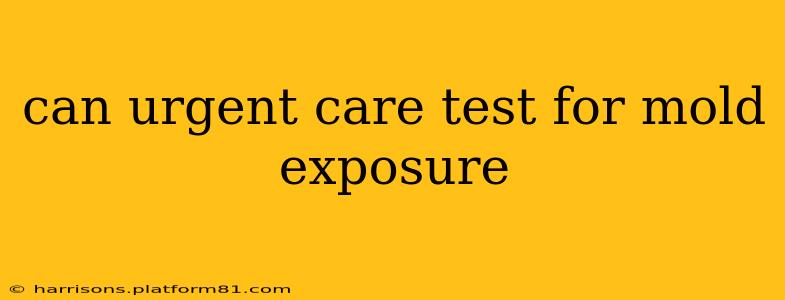Mold exposure can cause a range of health problems, from mild allergic reactions to severe respiratory issues. If you suspect you've been exposed to mold, you might wonder if urgent care can help. The answer is nuanced. While urgent care facilities can't directly test for mold exposure in the way a specialized lab can, they can play a crucial role in assessing your symptoms and guiding you toward appropriate testing and treatment. This article will explore what urgent care can do, what they can't do, and what steps you should take if you're concerned about mold exposure.
What Urgent Care Can Do for Mold Exposure Symptoms
Urgent care centers are equipped to evaluate your symptoms and provide immediate care for any acute health problems potentially linked to mold exposure. This includes:
- Assessing your symptoms: A medical professional will review your symptoms, such as coughing, sneezing, wheezing, skin rash, headaches, or eye irritation. They'll take your medical history and ask about your potential exposure to mold.
- Providing symptomatic treatment: If your symptoms are mild to moderate, the urgent care doctor can provide treatment to alleviate them. This might involve medications like antihistamines for allergies, decongestants for nasal congestion, or inhalers for asthma.
- Diagnosing underlying conditions: If your symptoms suggest a more serious underlying condition, such as asthma exacerbation or a severe allergic reaction, the urgent care physician can provide appropriate treatment and possibly refer you to a specialist.
- Referring you to specialists: If the symptoms are persistent or severe, or if they suggest a more complex issue, urgent care will likely refer you to a specialist, such as an allergist, pulmonologist, or environmental health specialist. These specialists can conduct more comprehensive testing to confirm mold exposure and determine the extent of its impact on your health.
- Providing advice and guidance: Urgent care doctors can provide advice on how to manage your symptoms and minimize further exposure to mold, including recommendations for cleaning your home or seeking professional mold remediation services.
What Urgent Care Cannot Do for Mold Exposure
It's crucial to understand the limitations of urgent care facilities when it comes to mold exposure:
- They cannot directly test for mold exposure: Urgent care centers don't typically have the equipment or expertise to perform mold tests. Mold testing requires specialized laboratory analysis of air or surface samples.
- They cannot determine the source of mold exposure: While they can assess your symptoms, they can't pinpoint the specific source of the mold exposure in your environment without further investigation.
- They cannot offer mold remediation services: Urgent care facilities are not equipped to handle mold removal or remediation in homes or workplaces. This requires specialized professionals in mold abatement.
How to Get Tested for Mold Exposure
To definitively determine if you've been exposed to mold and the extent of the exposure, you'll need to undergo specialized testing. This typically involves:
- Air sampling: This involves collecting air samples from your home or workplace to identify the types and quantities of mold spores present.
- Surface sampling: This involves collecting samples from surfaces suspected of mold growth to identify the types of mold present.
- Blood tests: In some cases, blood tests may be used to detect antibodies against specific mold species, indicating past exposure.
These tests are usually performed by environmental testing companies or specialists such as allergists or industrial hygienists. Your urgent care physician can help guide you to appropriate testing resources in your area.
Can Mold Exposure Cause Serious Health Problems?
Yes, mold exposure can cause a range of health problems, depending on the type of mold, the level of exposure, and individual sensitivities. Some individuals may experience mild allergic reactions, while others may develop more severe respiratory illnesses or other health issues. This is why it's vital to seek medical attention if you suspect mold exposure and are experiencing concerning symptoms.
When Should I Go to Urgent Care for Mold Exposure Symptoms?
You should seek immediate medical attention at an urgent care facility if you experience:
- Severe respiratory distress: Difficulty breathing, wheezing, or shortness of breath.
- Severe allergic reaction: Hives, swelling, or difficulty swallowing.
- Worsening of pre-existing conditions: Exacerbation of asthma, or other respiratory conditions.
If your symptoms are mild and not worsening, you may be able to schedule an appointment with your primary care physician.
By understanding the role urgent care plays in assessing mold exposure and knowing the necessary steps to get proper testing, you can effectively address your concerns and protect your health. Remember to always seek medical advice from a qualified healthcare professional for any health concerns.
